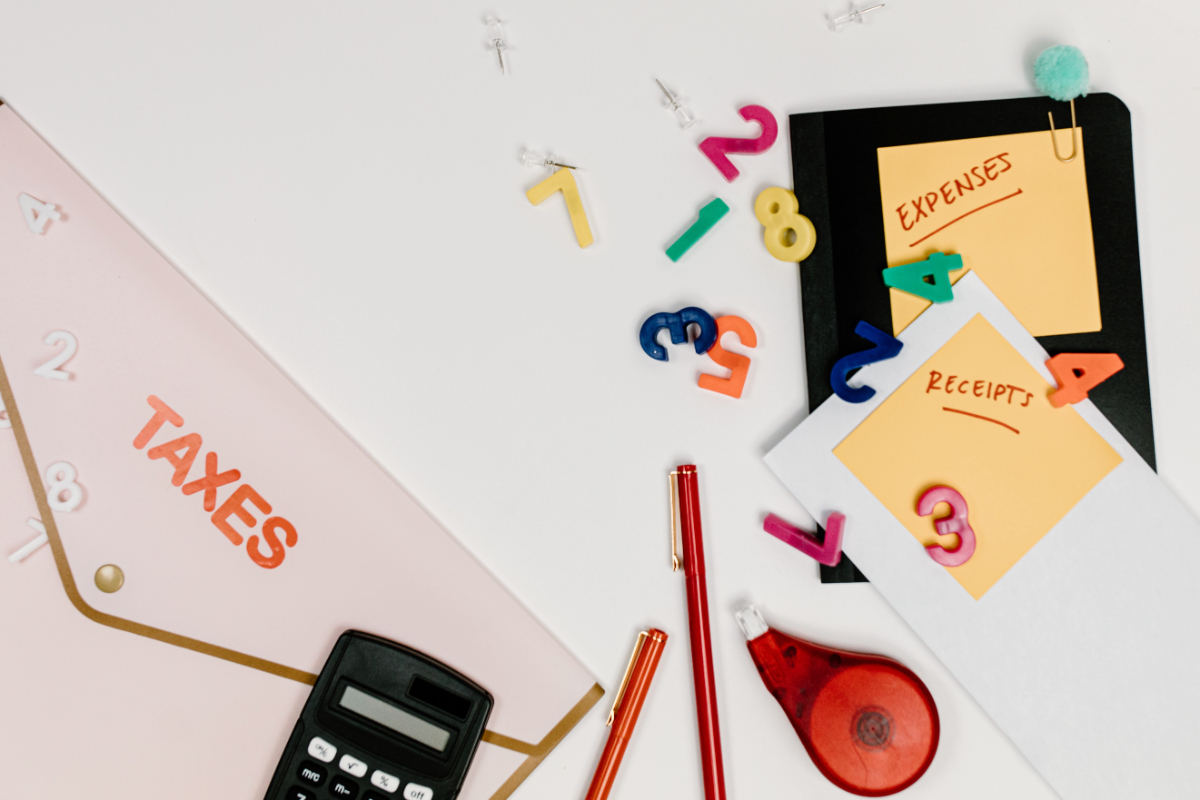Staying Organized at Tax Time (Or Any Time)
There are some affiliate links below, but they are all products I highly recommend. For more info, view my disclosure here.
Tax time can be one of the most stressful times of year. With paperwork, receipts, and deadlines all coming together at once, it can be hard to stay organized. But it doesn’t have to be that way! With a few simple tips and tricks, you can make staying organized easy and painless. Here’s how to get started.
First off, having a designated place for all your important documents is key. This could be a filing cabinet or just a folder in your desk drawer — an easily accessible spot where you know exactly where everything is. Make sure this area is neat and tidy so you don’t waste time sifting through piles of papers when you need something important.
Finally, create a checklist for yourself of items that need to be completed by the deadline. Jot down tasks as they come up throughout the process and cross them off as they’re completed. That way, you’ll always have an idea of what needs to be done next and won’t miss any steps along the way. With these three tips in mind, you’ll soon find yourself staying organized during tax season — or anytime!
1. Analyze Your Financial Records
When it comes to staying organized at tax time, or any other time for that matter, the most important step is to analyze your financial records. This may feel overwhelming, but taking the time to review and organize your financial records is essential for accurate and timely filing of taxes. This includes reviewing expenses and income from the past year so you can accurately report them on your tax return. Furthermore, you should also take a look at how much you’ve saved over the last year as well as what investments you’ve made.
A great first step in analyzing your financial records is making sure that all of your accounts are up-to-date. It’s important to make sure all transactions are documented properly so you can accurately report them on your taxes. Additionally, you should take some time to weed out any unnecessary transactions or expenses that don’t need to be included in a tax return. This way, when it’s time to file taxes, only relevant information will be reported.
Finally, it’s best practice to keep track of all of your paperwork throughout the year rather than waiting until tax season rolls around. You can use an online system such as Quicken or Mint for managing finances or keep physical documents like receipts and bank statements in one place for easy access when needed. Having everything organized throughout the year will save stress and hassle come tax season and make filing taxes much easier overall!
2. Create A Tax Preparation System
When it comes to staying organized at tax time (or any time), creating a tax preparation system is essential. There are several things you can do to get the most out of your system. First, you’ll want to make sure that all your paperwork is clear and easy to access. Investing in files and folders for documents such as receipts, bank statements, health care records, and other financial information can help keep everything in its place. Labeling each folder with the type of document inside will also help make finding what you need easier.
Next, consider using an online filing system or app like TurboTax or even Google Sheets to store all your information in one place. This will help save time when it comes to filing taxes since data will already be entered into the program. You can also use a spreadsheet software program such as Excel or Numbers if you prefer to work offline. Whichever route you take, make sure that any passwords associated with these programs are secure and can’t be easily guessed by others.
Finally, setting reminders on your phone or calendar can help ensure that nothing slips through the cracks. Whether it’s having enough funds for estimated taxes due quarterly or making sure you have all W-2s filed by certain dates, having a reminder will help keep everything on track so tax season doesn’t become too overwhelming. Taking these steps now can help make tax season much more manageable down the road.
3. Gather Necessary Forms
Organizing your taxes can be intimidating. To ensure that you don’t miss anything important, it’s important to gather all of the necessary forms before you get started. Depending on your individual situation and tax filing status, the forms you’ll need may vary, but there are some common forms that all taxpayers should consider gathering.
One of these is the 1040 form, which serves as a summary of your total income and deductions for the year. You’ll also need to fill out schedules A, B and C if applicable. Schedules A and B are used to report itemized deductions, while Schedule C is used to report any income earned through self-employment or other business activities. Other common forms include W2s from employers, 1099s for interest or dividend earnings, and 1098s for student loan interest or mortgage interest payments made throughout the year.
To make sure you don’t overlook any key documents, it’s wise to contact any third-party payers who made payments to you during the year such as banks or investment firms and request copies of their documents related to those payments. If you’re expecting a refund from state taxes paid in 2020, you’ll also want to make sure you have your state filing form handy as well.
Gathering all the right documents ahead of time will help ensure that your tax filing goes smoothly and that you receive all of the deductions and credits available to you. Taking this step now will save time and effort when it comes time to submit your return later in the season.
4. Use An Online Tax Software
Organizing taxes can be a daunting task, but using an online tax software can make it much easier. This type of software will walk you through each step of the filing process and help keep your information organized in one place. Plus, many of these tools have built-in features to help minimize taxes owed or maximize refunds.
When selecting an online tax software, there are several factors to consider. First, identify the features that are important to you such as the ability to file multiple forms or receive automated notifications. Additionally, research any extra fees that may be associated with the software such as state filing fees and compare them against other options. Finally, look for programs that offer customer support should you need assistance in navigating the platform or have questions about deductions or credits.
Once you’ve chosen a platform, take your time when filling out your forms and double-check all of the information for accuracy before submitting your return. Having everything organized ahead of time will make this process much smoother and help avoid costly mistakes due to incorrect entries. With careful preparation and an online tax software, staying organized at tax time doesn’t have to be a hassle!
5. Schedule Dedicated Time To Prepare Taxes
Organizing your taxes can be a daunting task, especially if you don’t have a system in place. Scheduling dedicated time to prepare for tax season is a great way to make sure you stay organized and on top of filing deadlines. To ensure that you don’t miss anything important, it’s essential to set aside enough time to review all documents, double-check calculations and file on time.
Making the most of your allocated tax prep time means being strategic with how you use it. Start by gathering up all of your necessary documents, like 1099s and W2s. Next review each item and keep track of any deductions or credits that may be applicable to your situation. Finally, use an online tax software or consult a tax professional to make sure all the details are accurately filled out before submitting your return.
To help avoid delays or errors during this process, it’s important to take regular breaks throughout the day so that you can stay focused and energized. Keep in mind that the more prepared you are ahead of time, the easier filing taxes will be when it comes down to crunch time. So go ahead and block off some hours on your calendar specifically for preparing taxes – this will help keep you organized and stress-free come April 15th!
6. Create A Filing System For Tax Documents
Organizing tax documents throughout the year can be a challenge. To make sure you’re ready come tax season, it’s important to create a filing system for all your documents. This way, your taxes will be easy to find and access when you need them.
When creating your filing system, think about what kind of setup makes the most sense for you. For example, if you have a lot of different types of documents, consider organizing them into categories like income, deductions and investments. You may also want to create separate folders for different years or types of returns.
No matter how you organize your files, make sure they’re easy to find when it comes time to file your taxes. You could label each folder with the type of document inside or color-code them depending on the year or type of return. Additionally, consider using an online storage option such as Google Drive or Dropbox to keep digital copies of all your documents in one place that’s easily accessible from anywhere.
It may take some time up front but having an organized filing system will save you time and stress in the long run. Plus, this way you’ll always know where to look when it comes time to prepare your taxes — no more scrambling around at the last minute!
7. Research Tax Benefits And Credits
Tax season can be a stressful time of year, and if you want to stay organized while filing, researching tax benefits and credits is an important step. Tax credits are reductions in the amount of taxes owed while tax deductions reduce taxable income. Therefore, it’s important to research the various credits and deductions available to you so that you can maximize your return.
First, start by looking at the credits and deductions that apply universally to most taxpayers. Some common deductions include charitable donations, medical expenses, and student loan interest payments; some common credits include child or dependent care expenses or adoption costs. Additionally, check for any state-specific benefits and see if you qualify for any special tax breaks in your area.
Second, take the time to look into more specific benefits that may not be widely known but could benefit you greatly. For example, there are certain educational programs like Lifetime Learning Credits or Coverdell Education Savings Accounts that can help lessen the burden of paying tuition or related fees for yourself or your children. This type of research will also help you determine which accounts should be used for long-term investments as some accounts offer more tax advantages than others.
Finally, once you’ve done your research on applicable credits and deductions, make sure you keep all relevant records on hand in case they’re needed when filing returns. As it is possible to overlook some potential savings opportunities when filing taxes, taking the time to do research now will ensure that won’t happen later down the line.
8. Keep Updated Records Of Tax Payments
Organizing financial documents and records can be daunting, especially at tax time. Fortunately, there are steps you can take to keep up with the paperwork and make sure your taxes are filed on time. One of those steps is to keep updated records of any tax payments you have made.
When it comes to taxes, having accurate and up-to-date records is essential for staying organized. This includes keeping track of all payments you’ve made, such as estimated quarterly taxes or any other deductions for the year. Keeping tabs on these payments will help you avoid overpaying or underpaying what’s owed on your tax return. Furthermore, if the IRS ever audits you, having records of all payments made will save you a lot of stress and hassle in the long run.
Fortunately, there are several ways to stay on top of your tax payment information. For starters, it’s a good idea to keep digital copies of your receipts and statements in case they’re ever needed down the line. You could also consider setting up automatic reminder alerts for when payment deadlines approach. Additionally, if it’s within your budgeting abilities, putting aside money throughout the year specifically for taxes can be a great way to ensure that they’re paid on time without putting too much strain on your finances come April 15th each year.
By taking these proactive measures now and keeping yourself organized throughout the year, you’ll be in a much better position come tax season – both financially and mentally!
9. Utilize Mobile Apps To Stay Organized
Mobile apps can be a great way to stay organized, especially when it comes to tax payments. They allow users to quickly and easily track and store vital information. For instance, an app can organize receipts and other documents related to tax payments, making them easier to access later on. An app can also help users keep track of their payments due dates, as well as how much they owe for each payment.
Using a mobile app for organization is also convenient because the data is stored securely in the cloud and can be accessed from any device with an internet connection. This means that no matter where someone is – at home or on the go – they can quickly check their records and ensure that they are up-to-date with their taxes. Plus, many apps offer features such as reminders, which help remind users of upcoming payment due dates so they don’t miss them.
Finally, using a mobile app to stay organized makes it easy for users to share their records with others if necessary. For example, information about tax payments could be sent directly to an accountant or financial advisor without having to manually gather all the documents and send them through snail mail or email attachments. This saves time and energy for both parties involved in the transaction.
10. Get Professional Tax Advice When Needed
When it comes to tax time, it is important to stay organized in order to save time and money. One step in staying organized is getting professional tax advice when needed. This can be helpful for those who are not familiar with the filing process or need additional help understanding their taxes.
Professional tax advice can come from a number of sources including accountants, lawyers, and other professionals who specialize in taxes. These professionals can help answer questions about deductions and credits as well as provide guidance on what forms need to be filled out and which documents should be included with the return. They can also offer suggestions on how to minimize taxes owed or maximize refunds received.
It’s important to remember that while professional tax advice can be very beneficial, it may also come at a cost. It’s important to research different professionals before making a decision so that you know exactly what you’re getting for your money. Also, make sure that the person you choose is properly licensed and insured so that any mistakes they make won’t put you at risk of penalties or audits from the IRS.
In addition, it’s always a good idea to get an opinion from more than one professional if possible. This way, you can compare advice and make sure that the information you’re getting is accurate and up-to-date. Taking these extra steps will help ensure that your taxes are filed correctly and that you are taking advantage of all available deductions and credits available to you this tax season.
Frequently Asked Questions
What Is The Best Way To Organize My Tax Documents?
Organizing your tax documents can be a daunting task; however, there are steps that you can take to make the process easier. To start, it’s important to determine what types of documents you need to save. These may include W-2 forms, 1099 forms, and any other relevant paperwork. You’ll also want to keep a record of all donations and other deductions that can help reduce your taxes.
Once you’ve sorted out exactly what documents you need, there are several ways that you can store them. Many people choose an online filing system, as it is convenient and secure – plus, it allows for easy access in case of an audit or other inquiry. Another option is to use a physical filing cabinet with folders labeled according to their contents. This method is especially helpful if you prefer having tangible copies of your records at hand.
No matter which storage option you go with, it’s best practice to back up your files on an external hard drive or another device in case the originals are lost or destroyed. Additionally, don’t forget to delete any sensitive information from computers or phones once you no longer need it for tax purposes. Staying organized throughout the year will ensure that when tax time rolls around again, everything is already in order and ready for filing!
Is It Better To Use A Paper Filing System Or A Digital System For My Tax Documents?
Organizing your tax documents is an important part of filing, and can often be the difference between getting a refund and owing money. There are two main ways to organize these documents – through a paper filing system or a digital one. In this article, we’ll look at the pros and cons of each method, so you can decide which one is best for you.
When it comes to paper filing systems, there are several advantages. One is that you don’t need any special software or technology – all you need is some folders and a way to keep track of what’s in them. Another advantage is that it’s very easy to take notes on paper, so you can make sure everything is organized just the way you want it. On the other hand, it can be time-consuming and difficult to find specific documents when they’re scattered across different folders and drawers.
Digital filing systems offer plenty of advantages too. For starters, they make it much easier to search for specific documents – whether that’s by date or content – so you can pull up exactly what you need quickly and easily. Digital filing also makes it easy to store large amounts of information without taking up physical space in your home or office. The downside is that if your computer crashes, then all your files could be lost forever unless you have them backed up somewhere else.
When deciding between a paper filing system or a digital one for organizing your tax documents, it’s important to consider both advantages and disadvantages before making a choice. Weighing up the pros and cons of each system will help ensure whatever decision you make works best for your needs and preferences.
How Can I Make Sure I Am Taking Advantage Of All The Tax Credits And Benefits Available To Me?
Organizing your tax documents is one of the most important parts of filing taxes. Knowing what credits and benefits you are eligible for can help make sure you get the best return on your taxes. So, how can you make sure that you’re taking advantage of all the tax credits and benefits available to you?
One way to make sure you’re properly using all the tax credits and benefits available to you is by researching them yourself. You can start by looking online at websites such as the IRS website or a professional tax preparation website. This will give you an overview of what types of credits and deductions may be applicable to your situation. Additionally, if necessary, it’s always a good idea to consult with a professional accountant or tax advisor who can help guide you through the process and provide expert advice on which credits might be beneficial for your tax situation.
Finally, another way to ensure that you’re taking advantage of all the tax credits and benefits available is by keeping organized records throughout the year. Keep track of any expenses related to business activities or investments that could qualify for deductions or credits when filing taxes. This will help streamline the process when it comes time to file taxes and allow for more accurate record-keeping which could save on time and money in the long run.
By doing some research, consulting with professionals if needed, and keeping organized records throughout the year, you can make sure that when it comes time to file your taxes, no stone has been left unturned in terms of maximizing potential tax savings opportunities.
Are There Any Free Tax Preparation Resources Available?
Tax season can be overwhelming, and it’s important to make sure that you’re taking advantage of every credit and benefit available to you. But with so many resources out there, it can be difficult to know where to start. That’s why it’s important to ask: are there any free tax preparation resources available?
The answer is yes! There are a variety of free online tax preparation services that can help make filing your taxes easier and more efficient. These services range from basic tax calculators to full-service software packages that will help you maximize your deductions and get the most out of your return. Some services even offer live customer support if you have any questions or run into any issues. In addition, a number of government organizations provide free tax preparation assistance for those who qualify.
No matter which option you choose, these free resources can help ensure that your taxes are done correctly and on time. Plus, they will save you money in the long run since you won’t have to pay expensive fees for professional tax preparation services. So if you’re feeling overwhelmed by all the paperwork involved in filing your taxes, remember that there are plenty of helpful tools available – for free!
What Are The Advantages And Disadvantages Of Using An Online Tax Software?
Tax time can be overwhelming. With so many forms and documents to manage, it’s easy to get lost in the shuffle. One of the most popular ways to stay organized is by using online tax software. But what are the advantages and disadvantages of this approach?
One advantage of using online tax software is that it simplifies the process. You don’t have to worry about manually filing paperwork or submitting information to the IRS; everything is handled electronically with just a few clicks of your mouse. Additionally, many online tax programs offer guidance and support throughout the entire process, making it easier for those unfamiliar with taxes to navigate their way through the complexities of filing.
On the other hand, there are some drawbacks to using online tax software. For one thing, if you’re not careful you could be charged fees for services like electronic filing or tax advice that you don’t need. Additionally, since you’re relying on a computer program rather than an actual person, there’s always a chance that mistakes may occur which could lead to costly penalties from the IRS.
Overall, whether or not using online tax software is right for you will depend on your individual situation and needs. If you’re comfortable with computers and familiar with taxes then this might be a great option for staying organized during tax time; however, if you need more personalized help then it might be better to consult a professional instead.






